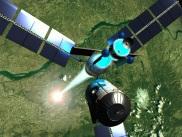Space sims are tricky, for sure. I have the feeling myself that fun isn't the point of them, or that fun isn't what saves them; what saves them is having a compelling fantasy that can fill out the many moments of watching a dot in the distance resolve into a planet/station/sun/whatever. (And lots of people are willing to do that, so there are certainly some well-crafted fantasies out there.)
It's sometimes hard to guess what that's going to be in *your* game, though, because of the special relationship you have with it. And also that you're new, and won't quite know what it is you're good at. It's good to get it in front of people early and get them to say what you're good at, so you can put an emphasis on things you do well. (Like if people say you make fantastic alien ship models, go hard on that, make it a game where that's really important.)
If I were making a space sim, I would play around with parts of the space fantasy that get a bit neglected. It seems like everyone has dogfights, ship customization, trading commodities, contraband, some standard human factions (feds/rebels/pirates/zealots)... meaning there's a lot of opportunity for players to indulge in that particular space fantasy. I had some fun with that fantasy in the past, but I'm not in need of any *more* of that fantasy. But there's lots of other parts of the space fantasy:
-- talking to interesting & unusual aliens and learning about their civilizations
-- ancient alien ruins & technology
-- crew management, training, relationships
-- space survival (e.g., looking for scarce resources far from civilization, just to survive)
-- trading things that aren't commodities (e.g., things there are only a few of and only some traders are interested in trading)
Starflight's a great suggestion; you should really play it if you haven't. It's always a surprise to me that that style of space game didn't become the dominant one.
For a "Starflight-like" that I love, that almost no one remembers and no one plays anymore, try Nomad (1993). Especially for your idea of having high-interactability NPCs. You could ask any NPC in the game about anything, and it had a few clever tricks to give the illusion that there was greater depth than the rudimentary chatbots actually had. (Like the characters would know about each other and could tell you things about other characters that they would reasonably know. If you asked about someone in their clan, or in their profession, they would probably be able to say something about them, and tell you their home base or their usual trading route. And while most characters were generic instances of their species differentiated only by a few variables, a few were actual individuals, adding to the illusion that maybe everyone's an individual and it's just that you haven't figured out what to ask to make them open up to you.)










